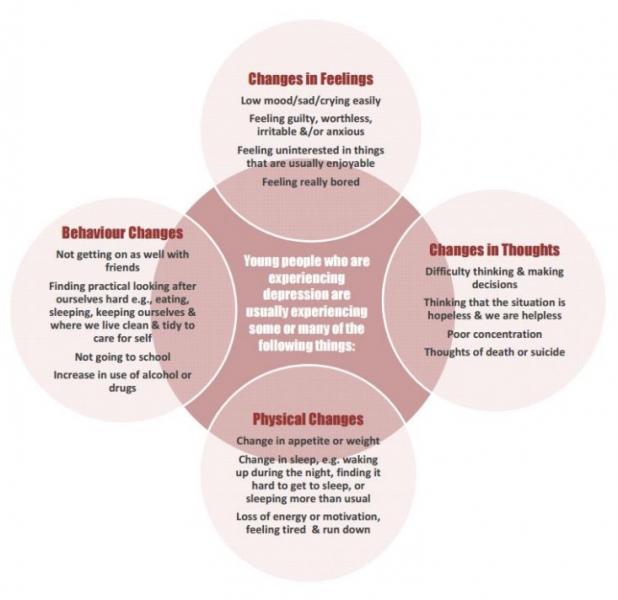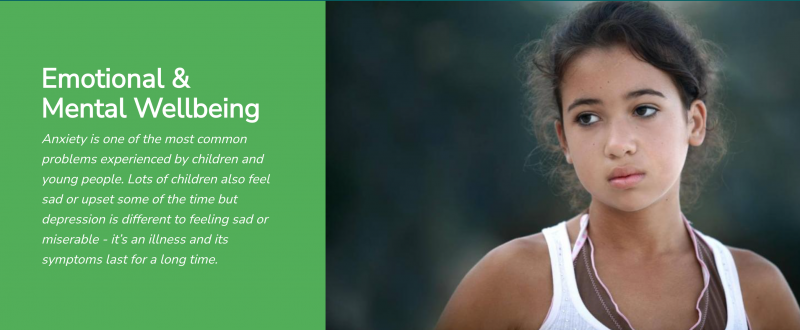Depression
Depression
Depression is a serious illness that can make it hard to do everyday activities. It is important to get help if you are concerned about your child's depression. Depression can be treated effectively.
Key points about depression in children and young people
- depression is a serious illness that can make it hard to do everyday activities
- it is important to get help if you are concerned about your child's depression
- depression can be treated effectively
What is depression in children and young people?
Lots of tamariki feel sad or upset some of the time. They may think everything is going wrong with friends, at school or at home. But depression is different to feeling sad or miserable - it's an illness and its symptoms can last for a long time. Depression can make it hard for a child or young person to carry out their everyday activities.
What are the signs and symptoms of depression in children and young people?
The symptoms of depression are often different for different people.
Common symptoms are:
- feeling miserable, irritable, and unable to cope
- anger and rage
- overreaction to criticism
- low self-confidence
- feelings of helplessness, hopelessness and guilt
- difficulty experiencing pleasure like they used to
- trouble sleeping or waking up earlier than usual
- changes in appetite
- frequent complaints of physical illness (such as headaches, stomach aches)
- poor concentration, memory and decision making skills
- being overwhelmed and thinking negatively about the future
- acting out
- refusal to work or cooperate
- thoughts of suicide and self harm
- loss of sexual desire in teens
Depression in children and young people is different to adults, and they may be more irritable and act out than sad. Some tamariki may not be able to express in words how they are feeling because of their age. Teenagers and children may also deny they have a problem or 'put on a happy face'. They may be concerned people will think there is something wrong with them and not understand what is going on for them.
It is important not to see symptoms of depression as 'just being a teenager' and a phase they will grow out of. This is not the case. Depression is a serious illness that needs the right treatment.
The signs and symptoms of depression may be shared with other childhood problems (such as anxiety). Professional help is important for a proper assessment.
Check out some signs and symptoms of depression (PDF, 220KB).
Read Werry Workforce Whāraurau’s booklet 'Depression: A Guide For Families/Whānau' (PDF, 501KB).
Find out about anxiety in children and young people
Find out about self harm in children and young people
How common is depression in young people?
Both boys and girls can get depression. Depression is more common in teenagers than children - it affects about 1 in 5 rangatahi.
Tamariki and rangatahi who are at higher risk for depression are those who are very stressed, have learning or behaviour difficulties, or have experienced a loss.
What causes depression in children and young people?
No one knows the exact cause of depression, but experts believe a combination of environmental and biological factors are important. Research has shown that depression can run in families. Stressful and negative events can also cause depression. Alcohol and drug use and physical illnesses also increase a person's chances of having depression. A person who focuses on the negative aspects of life is also more likely to have depression.
How can I support my child with depression?
In this video demonstration with actors, a father talks with both a friend and then with his son. This shows how to start the conversation and support your child if you are worried they may be depressed. A professor of child and adolescent psychiatry explains why the positive methods shown here are good ways to start tackling teenage depression.
Watch the video by Raising Children Network.
View a transcript of this video (PDF, 100KB).
The sooner depression is recognised and treated, the greater the chances of recovery. Talk with your child or young person and suggest it might help them feel better by getting some help.
Other things you can do to support them include:
- ask what they need - don’t make assumptions
- listen with open ears
- be patient with them
- learn about depression, especially if you haven’t experienced it yourself
- do things together, such as going for walks together
- keep them involved in family activities
- encourage a healthy sleep pattern
- give practical support, like driving them to activities
- offer to go with them to see a health professional
Discover online tools to support your child’s mental wellbeing
Find mental health helplines and support services
When should I seek help for my child's depression?
If you are concerned a child or young person is depressed and has had continuing symptoms for more than 2 weeks, it is important to seek help for them. It is important that a professional who knows about depression in tamariki and rangatahi does the assessment. A physical check is also a good idea. This is to make sure there no other illness causing the symptoms.
Going to your family doctor is the best first step. They can give you advice about where to get more help. This may involve seeing a counsellor in the community. Or it may involve seeing a local child and adolescent mental health service. This can provide specialist assessment and treatments. You could also encourage your teenager to talk to their school counsellor.
Find helplines and mental health support services
What is the treatment for depression in children and young people?
Medicine and psychological therapy are the 2 researched treatments for depression. These can happen independently or together. The treatment chosen will often depend on how severe the depression is and personal preference.
Antidepressant medicine
Antidepressant medicine influences the chemicals in the brain to improve a person's mood and can be helpful for moderate to severe depression. A doctor needs to prescribe medicine and your child needs to take it for a number of weeks to feel a difference. People usually keep taking the medicine for a number of months. Antidepressant medicine is not addictive. Doctors will discuss with you how the medicine works and any possible side effects. These don't usually last long and you can usually manage them easily.
Psychological therapy
Psychological therapy can help people learn new ways to overcome depression. The focus of therapy is on thoughts, feelings and behaviours. Therapy can teach people new ways to deal with difficult situations and to change the way they think about events and situations.
Watch this video from The LowDown of Sofia talking about her experience of depression and the things she found helped her overcome it.
Watch other videos about depression on The LowDown.
More KidsHealth content on emotional and mental wellbeing
Find ways to help cope with worry and anxiety about COVID-19
See the KidsHealth's section on emotional and mental wellbeing
This page last reviewed 15 July 2022.
Do you have any feedback for KidsHealth?
If you have any feedback about the KidsHealth website, or have a suggestion for new content, please get in touch with us.
Email us now

